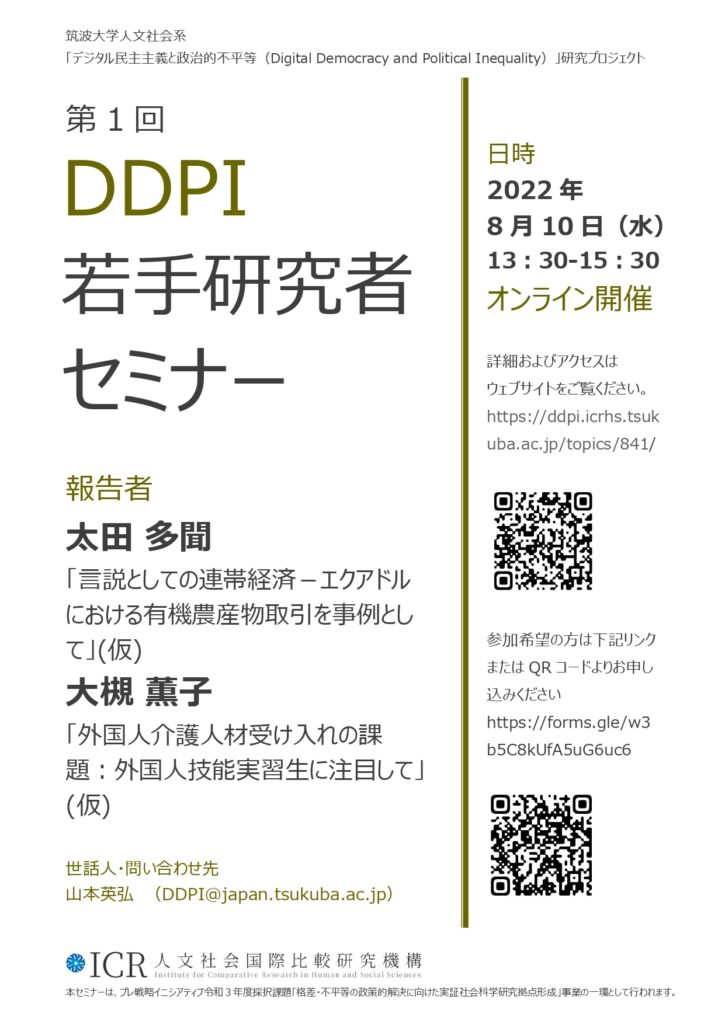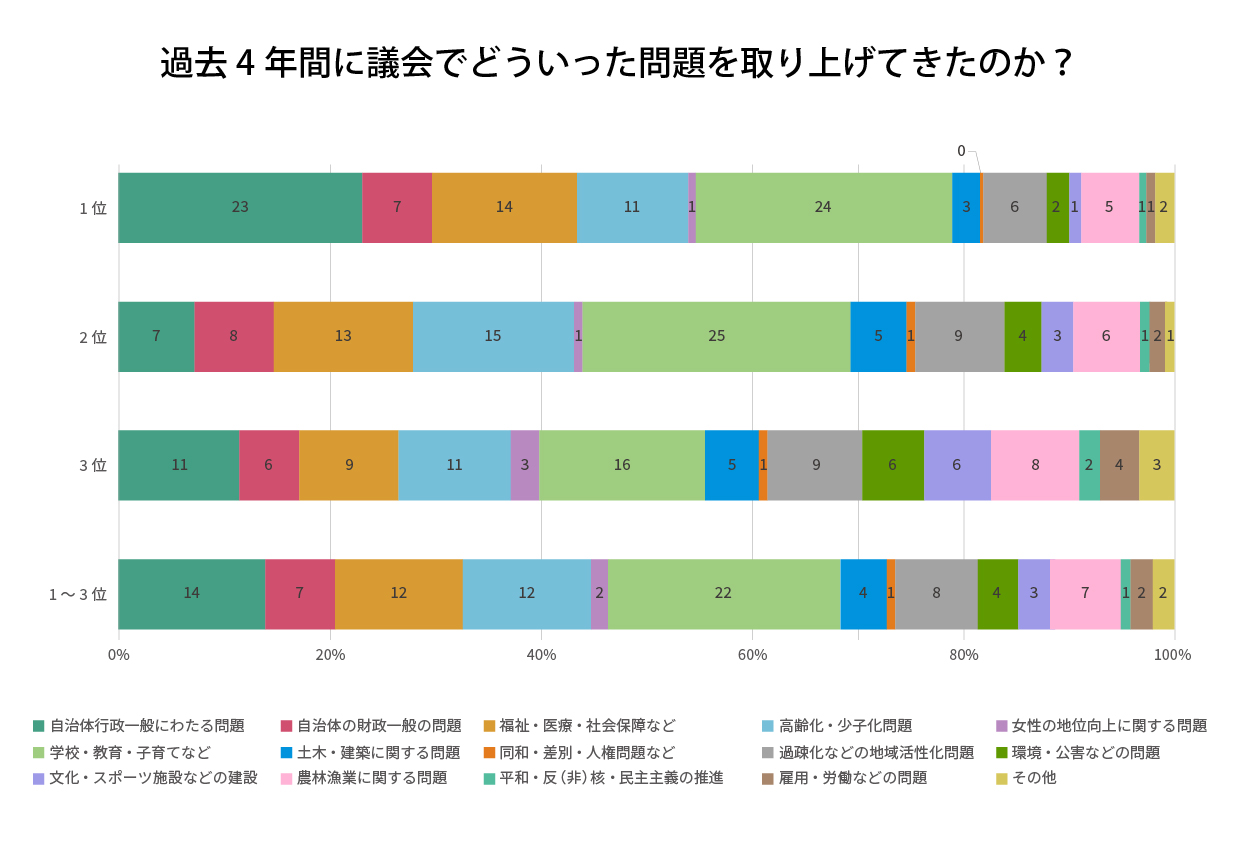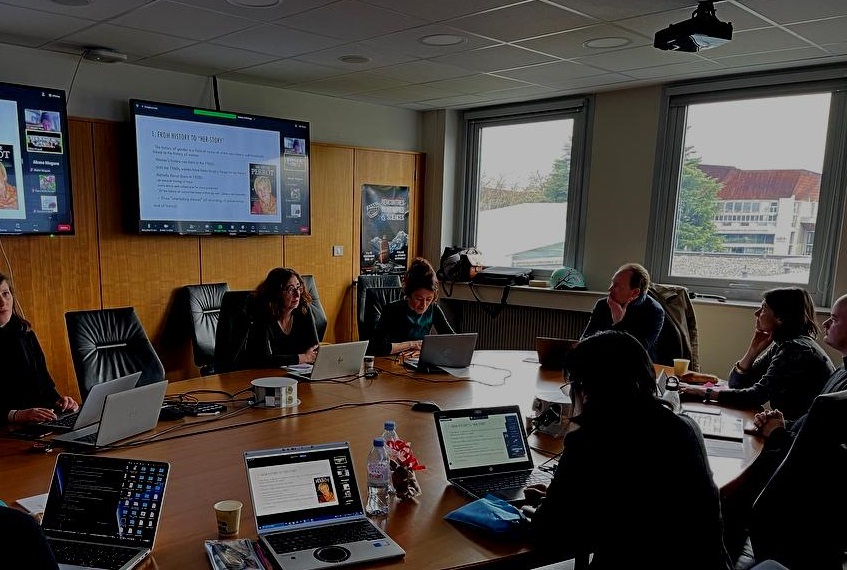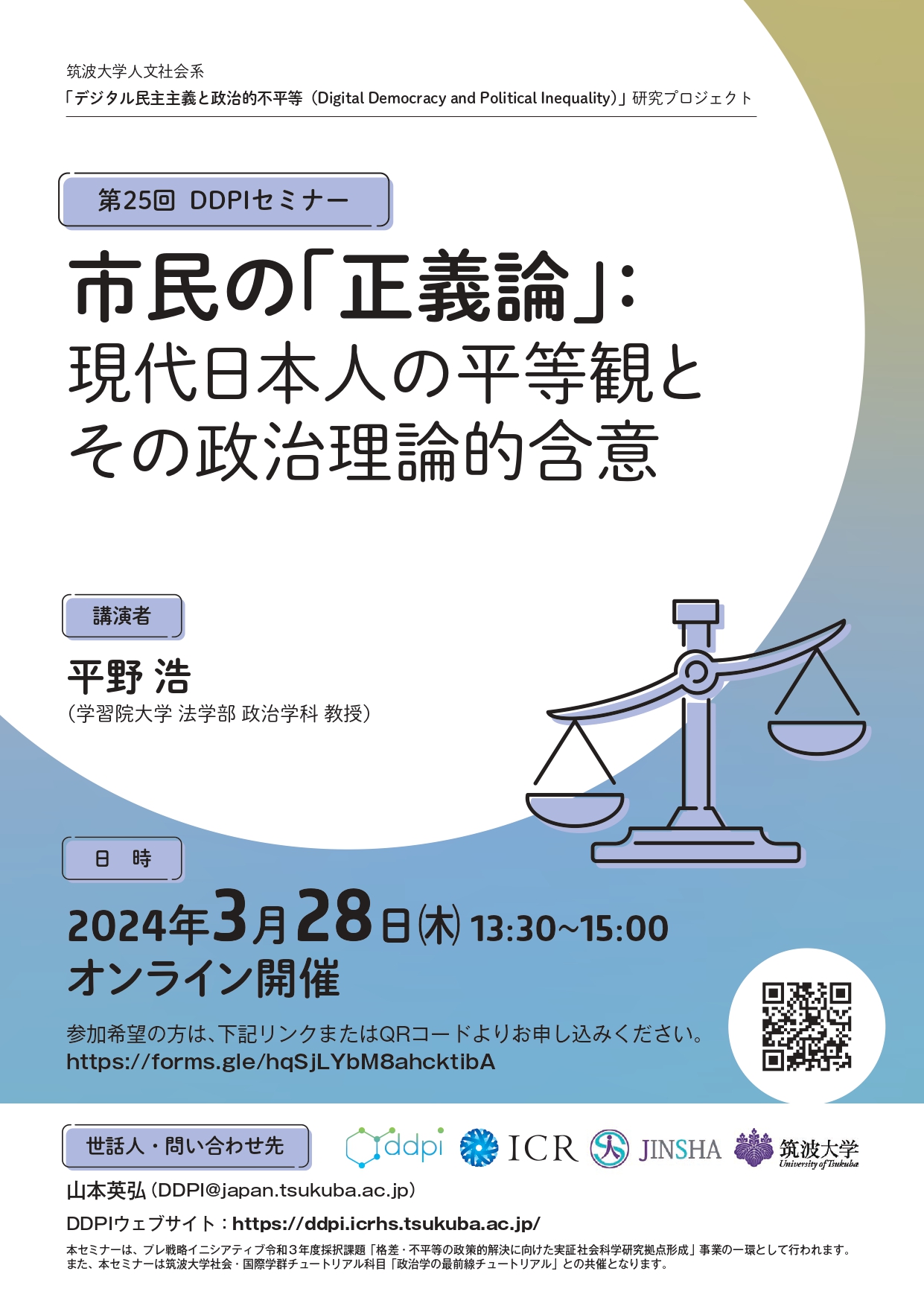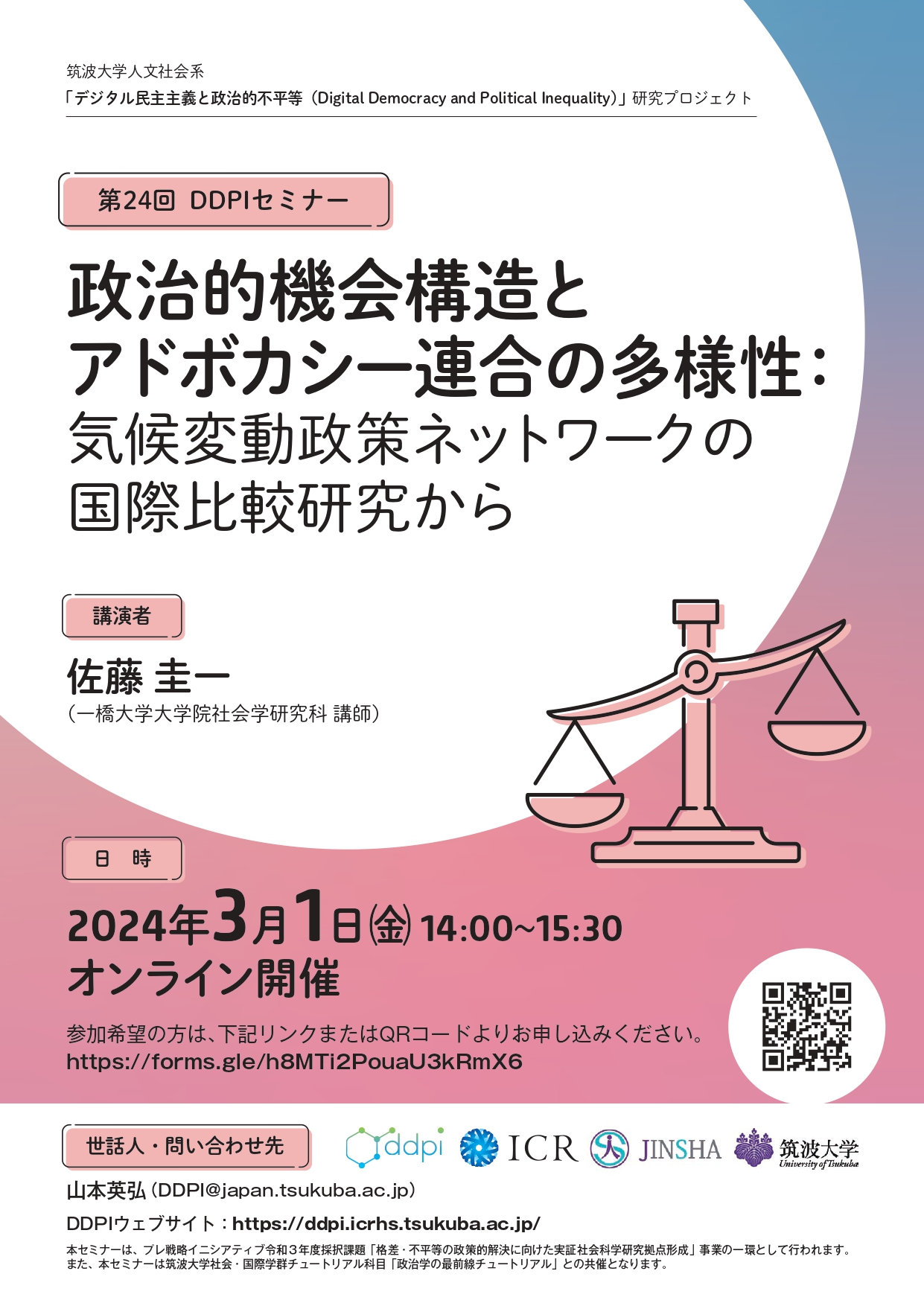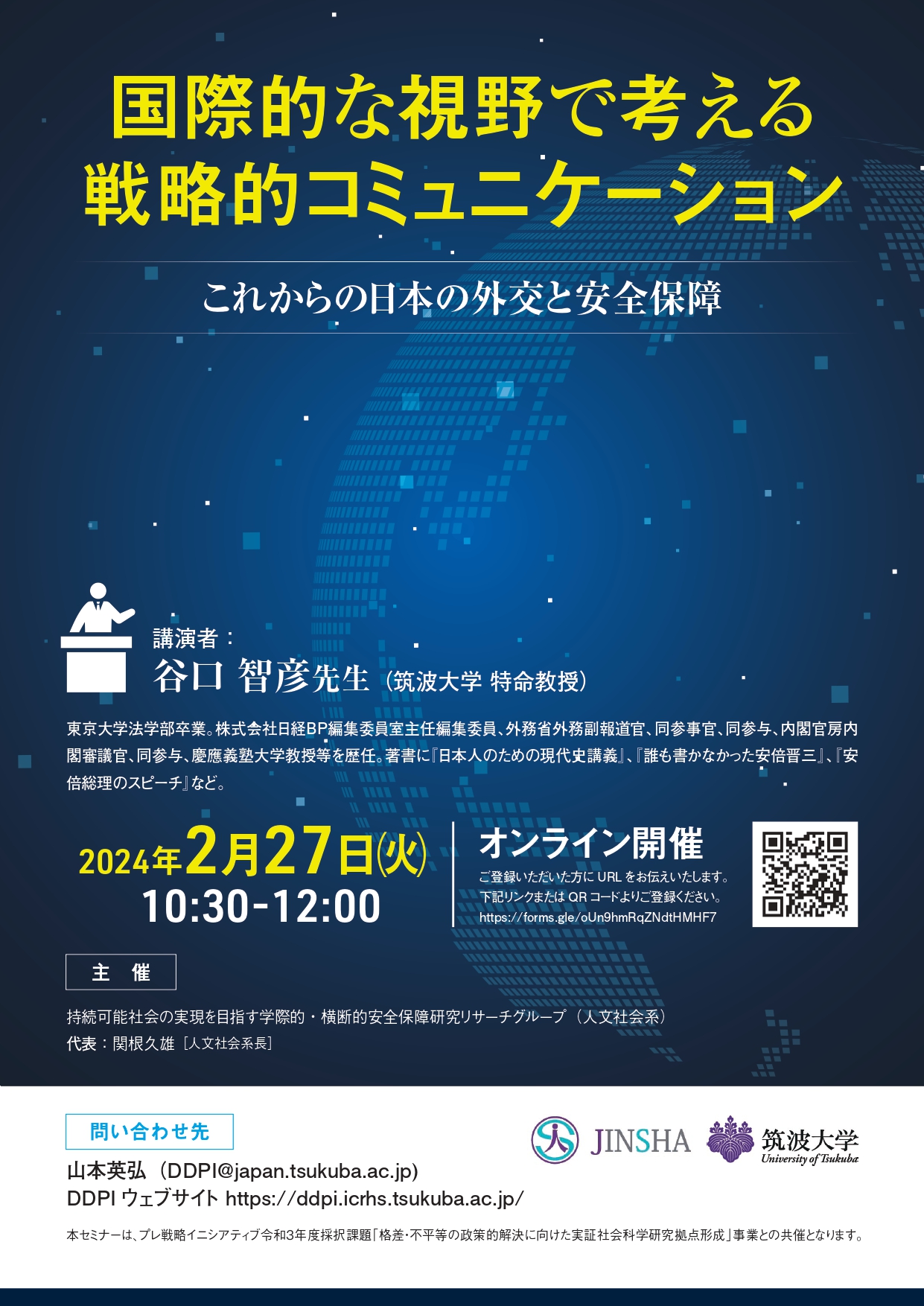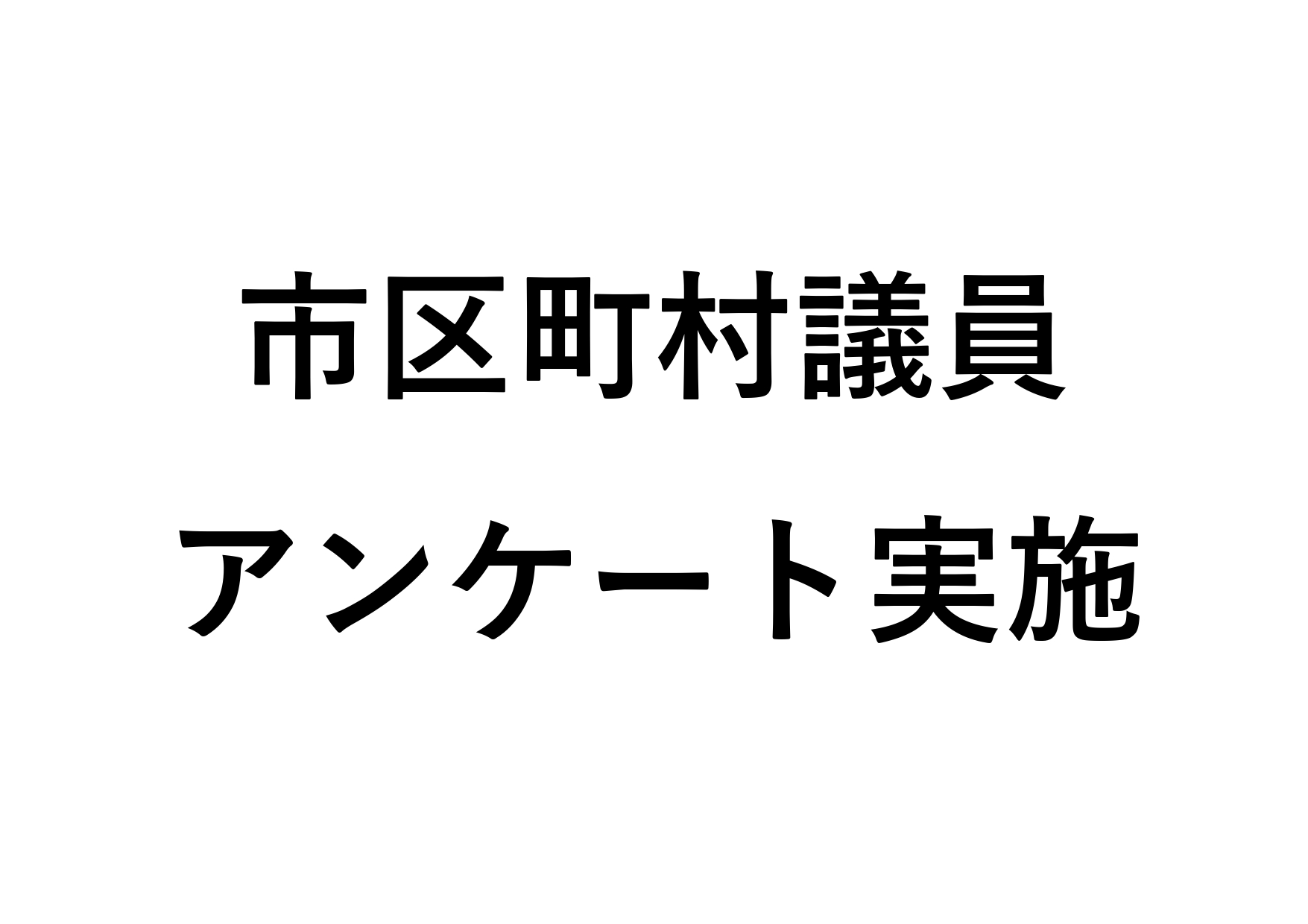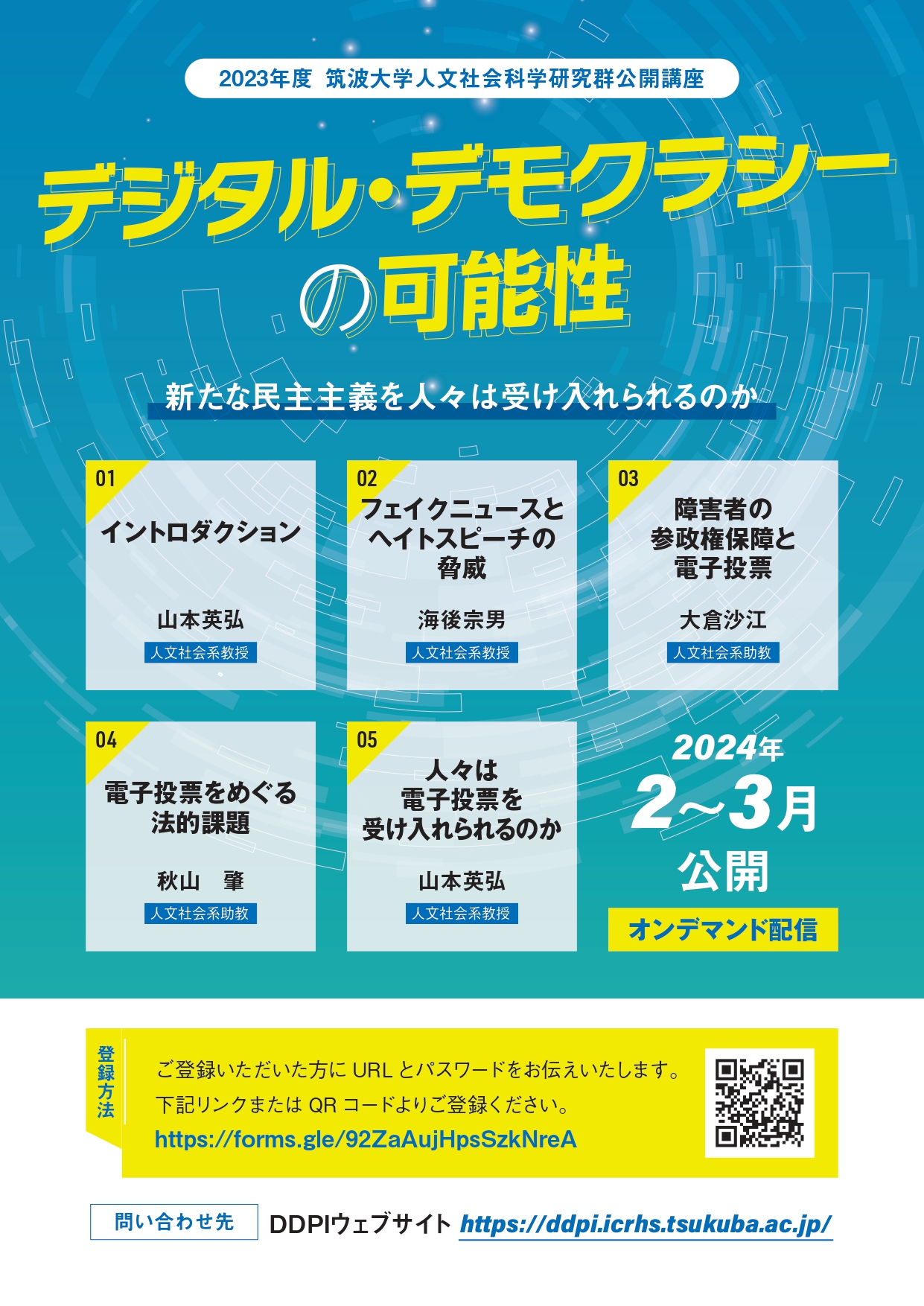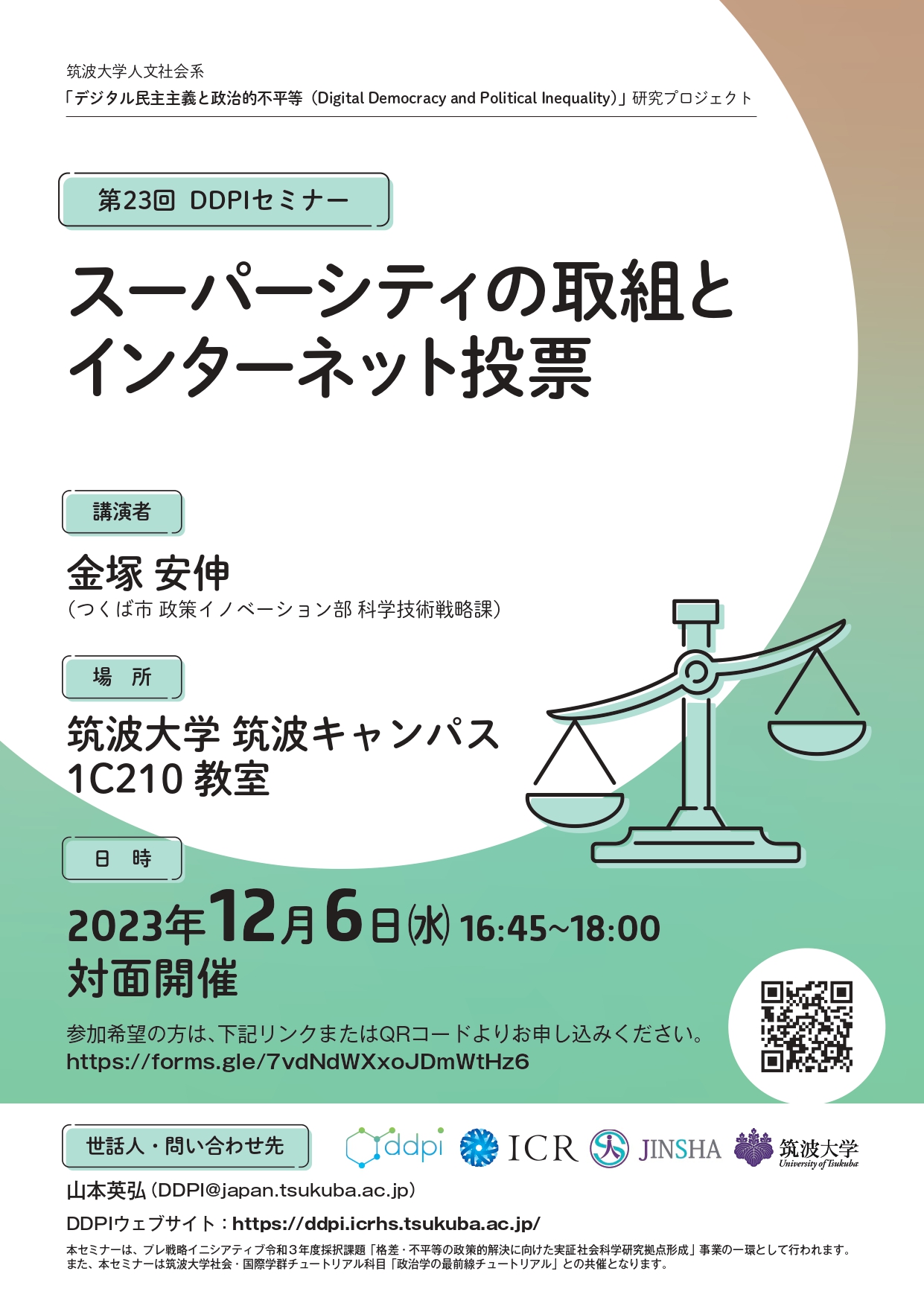ご挨拶GREETING
The DDPI project is organising a series of seminars on policy solutions to inequality and disparity, and the potential of digital technology for this purpose (digital democracy).
In this 25th edition, we will hear from Professor Hiroshi Hirano of the Department of Political Science, Faculty of Law, Gakushuin University, on the topic of “Citizens’ ‘Theory of Justice’: The Modern Japanese View of Equality and Its Political Theoretical Implications”. Professor Hirano has long studied voters’ behaviour towards politics, including their voting behaviour in elections and their support for political parties. More recently, he has focused on what ‘justice’ means in society, how people interpret this concept and how this understanding influences political behaviour. The seminar will show how we have analysed the changing nature of Japanese society and voting behaviour. We will also discuss what ‘justice’ means and how the concept of ‘justice’ in contemporary society affects our daily lives and political behaviour.
All interested parties are welcome to attend.
| date and time | Thursday, 28 March 2024, 13:30-15:00. |
|---|---|
| Location | Online |
| Presenter | Hiroshi Hirano (Professor, Department of Political Science, Faculty of Law, Gakushuin University) |
| Fee | Free |
| How to apply | If you wish to participate, please register via the link below or the QR code on the poster. |
| Contact details | DDPI@japan.tsukuba.ac.jp |
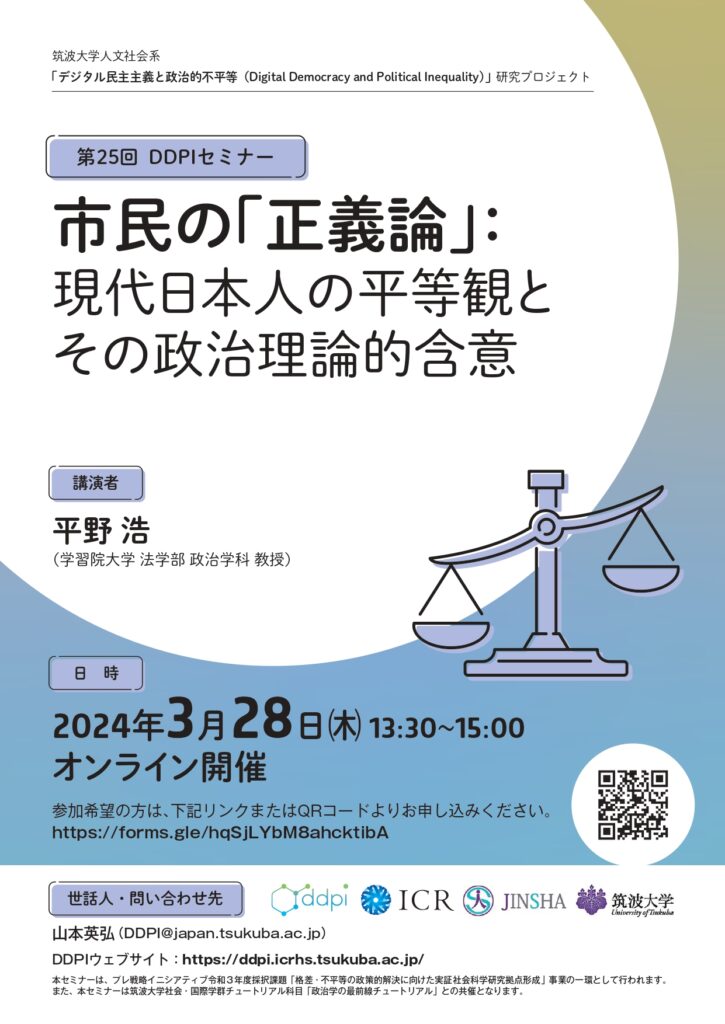
The DDPI project is organising a seminar series on policy solutions to disparities and inequalities, and the potential of digital technologies for this purpose (digital democracy).
This 24th seminar, entitled ‘Political Opportunity Structures and the Diversity of Advocacy Coalitions: An International Comparative Study of Climate Change Policy Networks’, will be held by Professor Keiichi Sato, Lecturer at the Graduate School of Sociology, Hitotsubashi University. Professor Sato’s research focuses on identifying the structure of policy networks in different countries and how they influence policy formation, particularly through international comparisons in climate change policy. At the seminar, Dr Sato will share her previous research findings and insights into the diversity of political opportunity structures and advocacy coalitions in climate change policy formation.
All interested parties are welcome to attend.
| Date and time of the event | Friday, 1 March 2024, 14:00-15:30. |
|---|---|
| Place of the event | online |
| Presenter | Keiichi Sato (Lecturer, Graduate School of Sociology, Hitotsubashi University) |
| Participation fees | Free |
| How to apply |
no longer being accepted |
| Contact details | DDPI@japan.tsukuba.ac.jp |
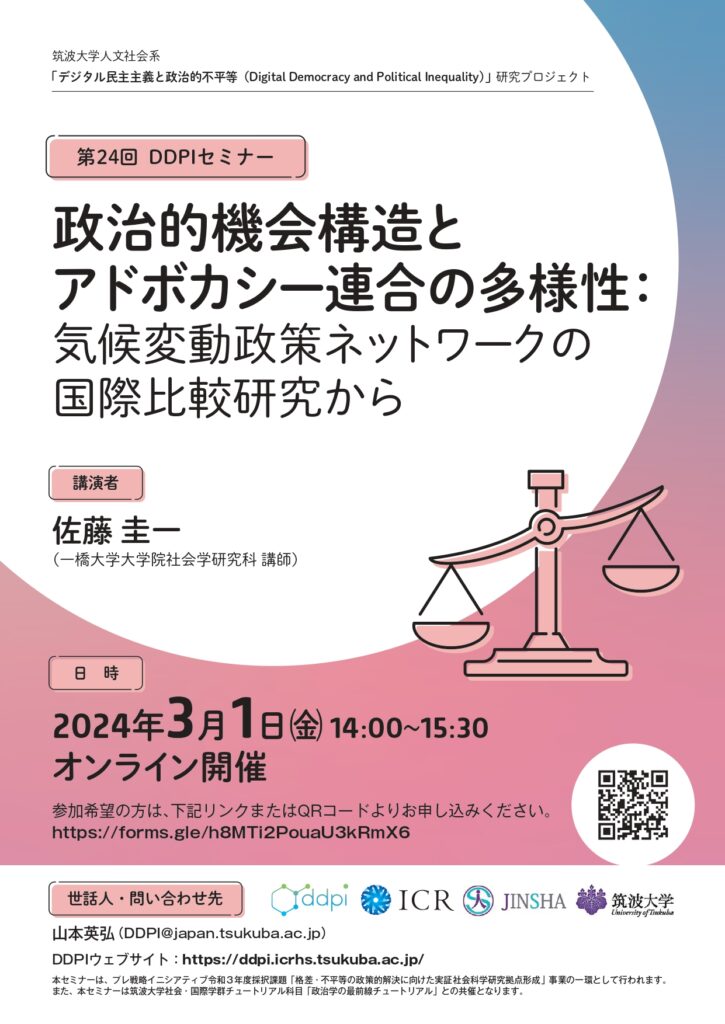
The University of Tsukuba’s Humanities and Social Sciences Department has established a research group at the end of 2023 to promote security studies that serve the goal of realising a sustainable society. From now on, the group will pursue research from interdisciplinary and cross-disciplinary perspectives, including area studies, political science, international relations, sociology, law, linguistics and cultural anthropology, to explore the nature of security in contemporary society from theoretical, empirical and practical perspectives. For the first seminar, Tomohiko Taniguchi, a specially appointed professor at the University and a foreign policy speechwriter for the Prime Minister, will be invited as a lecturer to discuss Japan’s diplomacy and security.
This seminar is co-organised with the project “Formation of a Research Centre for Empirical Social Science Towards Policy Solutions to Disparities and Inequalities”, which was adopted in FY2021 by the Pre-Strategic Initiative.
All interested parties are welcome to attend.
| Date and time of the event | Tuesday, 27 February 2024, 10:30- 12:00. |
|---|---|
| speaker |
Mr Tomohiko Taniguchi (Specially Appointed Professor, Tsukuba University) |
| venue |
Held online |
| Participation fees |
Free |
| application |
no longer being accepted |
The DDPI project is organizing a seminar series on policy solutions to disparities and inequalities, and the potential of digital technology for this purpose (digital democracy).
n this 15th session, titled “Guarantee of Voting Rights and the Future of E-Voting in Japan,” we invite Dr. Kazunori Kawamura, Associate Professor at the Graduate School of Information Science and Technology, Tohoku University. Dr. Kawamura has been conducting various studies on the use of ICT in politics and public administration, focusing on examining the possibilities of e-voting, identifying issues of digitalization of local assemblies, and analyzing open data policies. He also has experience in the Ministry of Internal Affairs and Communications’ study group on improving the voting environment, etc. This time, we will deepen the discussion mainly with stories based on such research and experience.
We look forward to your participation.
| 開催日時 | Thursday, December 15, 2022, 15:10-16:40 |
|---|---|
| 開催場所 | online |
| 報告者 | Kazunori Kawamura (Associate Professor, Tohoku University Graduate School of Science and Technology) |
| 参加費用 | Free |
| 事前申し込み方法 | If you wish to attend, please register via the link below or the QR code on the poster. |
| お問い合わせ先 | DDPI@japan.tsukuba.ac.jp |
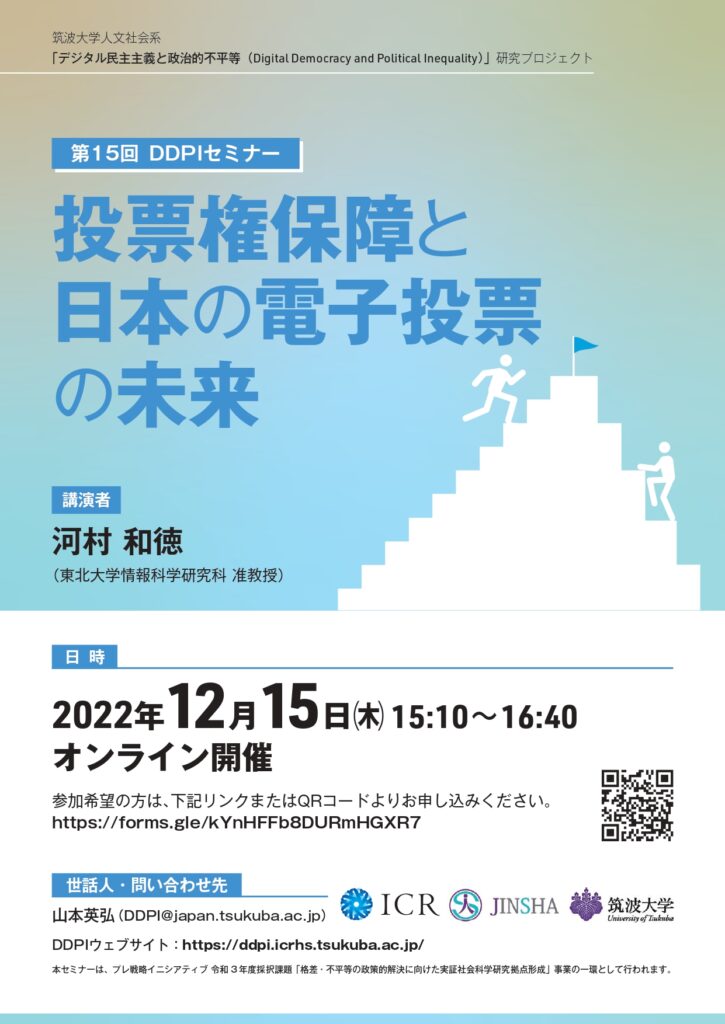
The DDPI project has organized the second seminar for young researchers on December 1 (online), mainly for post-doctoral and graduate students in the humanities and social sciences, in order to arouse young researchers’ interest in a wide range of topics related to solving issues of disparity and inequality, the potential of digital technology for this purpose (digital democracy), and digital transformation, and to expand the scope of their research through research exchanges and opinions.
Details are as follows. We hope that all persons and graduate students related to the Humanities and Social Sciences Research Group will feel free to attend.
| Date & Time | Thursday, December 1, 2022, 13:30-15:30 |
|---|---|
| Location | online |
| Reporter |
Toshiyuki Aoyama(Master’s and Doctoral Program in International and Advanced Japanese Studies) Yuko Kano(Master’s and Doctoral Program in International and Advanced Japanese Studies) Yoshimi Fukumura(Master’s and Doctoral Program in International and Advanced Japanese Studies) |
| Contact us |
Toshiyuki Aoyama「Far from the Lost 30 Years – Postwar Democracy and the Political Culture of Self-Responsibility」(Temporary) Yuko Kano「Watchful Eyes on the Corona Disaster」(Temporary) Yoshimi Fukumura「Disappearing integrity of intangible cultural heritage of ice」(Temporary) |
| Participation Fee | free |
| お問い合わせ先 | DDPI@japan.tsukuba.ac.jp |
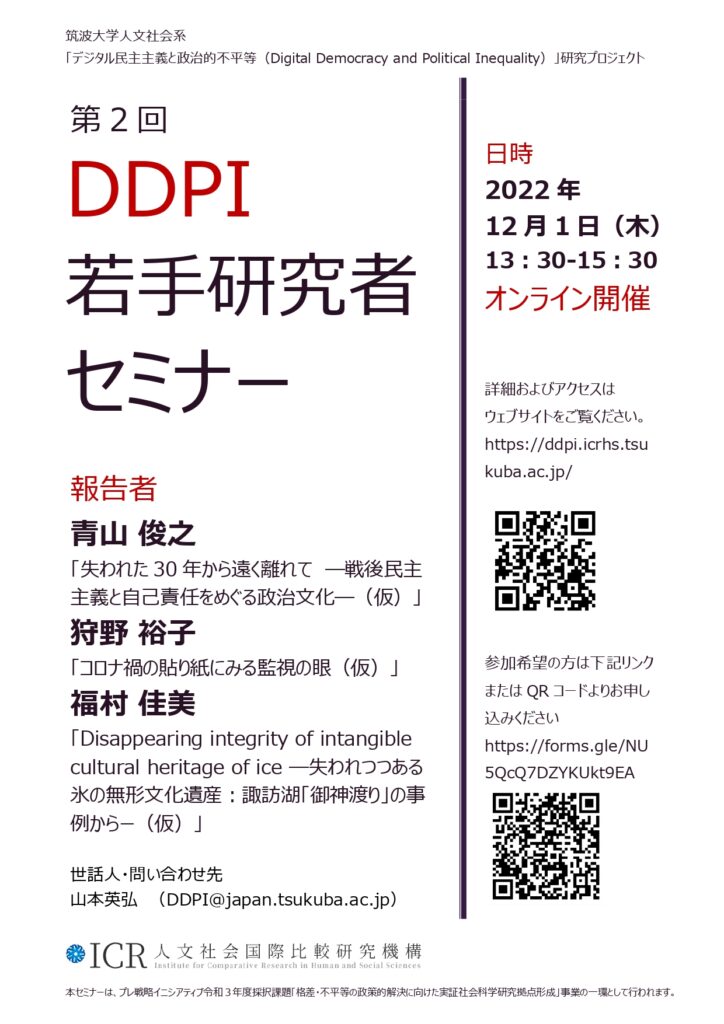
The DDPI project has been holding a series of seminars on policy solutions to inequality and disparity, and the potential of digital technology (digital democracy) for such solutions.
We are pleased to invite Professor Yuichiro Mori (Associate Professor, Faculty of Law, Hokkaido University). The seminar will be entitled “What Is Equality? An Introduction to Contemporary Theories of Justice He will provide a talk from the standpoint of philosophy of law on the fundamental question of what equality means.
| Date & Time | Thursday, November 17, 2022, 15:10-16:40 |
|---|---|
| Location | online |
| Reporter | Yuichiro Mori( Associate Professor, Faculty of Law, Hokkaido University) |
| Participation Fee | free |
| How to apply | If you wish to attend, please register via the link below or the QR code on the poster. https://forms.gle/YVWdL85pxnL1c5NA8 |
| Contact us | DDPI@japan.tsukuba.ac.jp |
We look forward to your participation.
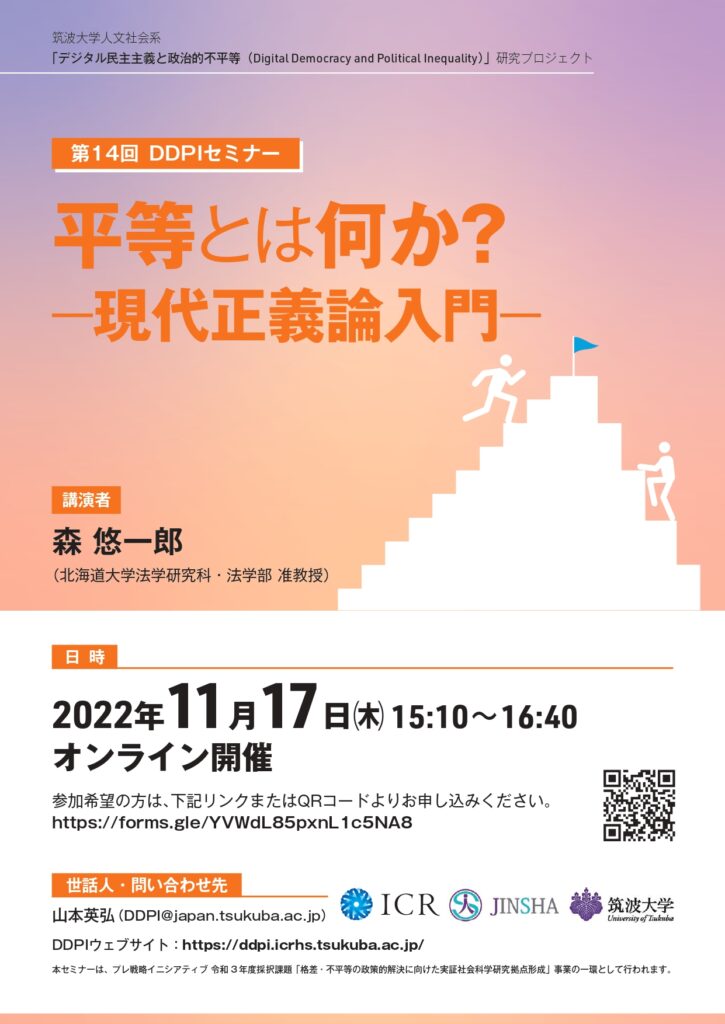
Tsukuba Global Science Week (TGSW) is an international symposium hosted by the University of Tsukuba that welcomes presenters from around the world in a variety of fields.
The 12th TGSW2022 will be held from September 26 (Monday) to 30 (Friday), 2022.
The DDPI project will participate in TGSW2022 on September 26 under the theme “Inequality and Social Activism around Women”.
The session will take place in an online format.
Inequality among women is still a serious problem that needs to be solved not only in developing countries but also in developed countries. This session will focus on various inequalities in the labor field and working styles, and discuss ways to achieve gender equality through social activities.
If you are interested in attending, please register at the TGSW2022 official website.
If you have any questions, please contact DDPI@japan.tsukuba.ac.jp.
| Date & Time | Monday, September 26, 2022, 19:00-21:00 |
|---|---|
| Location | online |
| Reporter |
Daniela Bolzani (Senior Assistant Professor in management at the University of Bologna.) |
| Participation Fee | free |
| How to apply | If you wish to participate, please register on the official TGSW2022 website. (Registration will begin in late August) |
| Contact us | DDPI@japan.tsukuba.ac.jp |

The DDPI project has been holding a series of seminars on policy solutions to inequality and disparity, and the potential of digital technology (digital democracy) for such solutions.
This time, we will return to the online venue and invite Professor Jun Imai of the Department of Sociology, Faculty of Integrated Human Sciences, Sophia University, to discuss “Employment reforms and social inequality in Japan: the institutional inertia of industrial citizenship”. He will talk about employment relations in Japan, a major topic that cannot be avoided when considering issues of disparity and inequality in today’s society.
In the past, the myth of “company-centered society” was a common narrative in Japan. Starting with the lump-sum hiring of high school and university graduates, there was a time when the enormous contribution of ” kaishainingen,” people who serve their companies through high loyalty to them, and the long-term employment practices, closed corporate human resource management, and skill development based on membership were praised as characteristics of such a society. However, this dual structure was only focused on large corporations and civil servants, and labor unions focused on forming bargaining relationships within the industrial sector, so the small, medium, and micro enterprises and their workers, as well as self-employed and sole proprietors, who actually make up the majority of Japanese society, were often ignored and criticized.
The deregulation of the labor field that began in earnest in the 1990s, combined with the restructuring of large companies that began with the collapse of the bubble economy and the difficulty of finding new graduates, has led to the emergence of temporary and dispatch workers who are positioned outside the closed employment relationship as an adjustment valve. This, combined with low wages compared to regular employees, has created a major division in the world of workers.
It is important to note that the employment practices of large corporations and public servants have not brought about new universality or equality in today’s employment relationships, where such past dual structures and the recent problem of “irregularity” exist on top of each other. The momentum of employment practices still remains as a strong corporate citizenship, and the employment practices of these large corporations and public officials upstream in economic relations still strongly constrain social practices and formal institutions such as marriage and family, child rearing and education, social security and welfare, and housing.
In this seminar, Professor Imai, who specializes in sociology of labor and social stratification, will share his knowledge on the state of Japanese society from the perspective of employment relations and employment practices, and discuss a wide range of ideas for tackling the issues of inequality and disparity.
We look forward to your participation.
| Date & Time | Monday, September 5, 2022, 14:00-15:30 |
|---|---|
| Location | online |
| Reporter | Jun Imai (Professor, Department of Sociology, Faculty of Integrated Human Sciences, Sophia University) |
| Participation Fee | free |
| How to apply | If you wish to attend, please register via the link below or the QR code on the poster. https://forms.gle/ZTCGYMhQQGL2GSNa9 |
| Contact us | DDPI@japan.tsukuba.ac.jp |

Tsukuba Global Science Week (TGSW) is an international symposium hosted by our university that welcomes speakers from various fields around the world.
The 12th “TGSW2022” will be held from September 26th (Monday) to 30th (Friday), 2022 in an online format and a hybrid format of onsite and online at the Tsukuba International Congress Center. is.
The DDPI Project will join TGSW2022 with the theme “Inequality and Social Activism around Women”.
Sessions will be conducted in an online format.
Inequality among women is a serious problem that still needs to be solved not only in developing countries but also in developed countries. In this session, we will focus on various inequalities in the field of labor and working styles, and discuss ways to achieve gender equality through social activities.
For more information, please visit the official TGSW2022 website.
| Date & Time | Monday, September 26, 2022, 19:00-21:00 |
|---|---|
| Location | online |
| Reporter |
Daniela Bolzani (Senior Assistant Professor in management at the University of Bologna.) |
| Participation Fee | free |
| How to apply | If you wish to participate, please register on the official TGSW2022 website. (Registration will begin in late August) |
| Contact us | DDPI@japan.tsukuba.ac.jp |
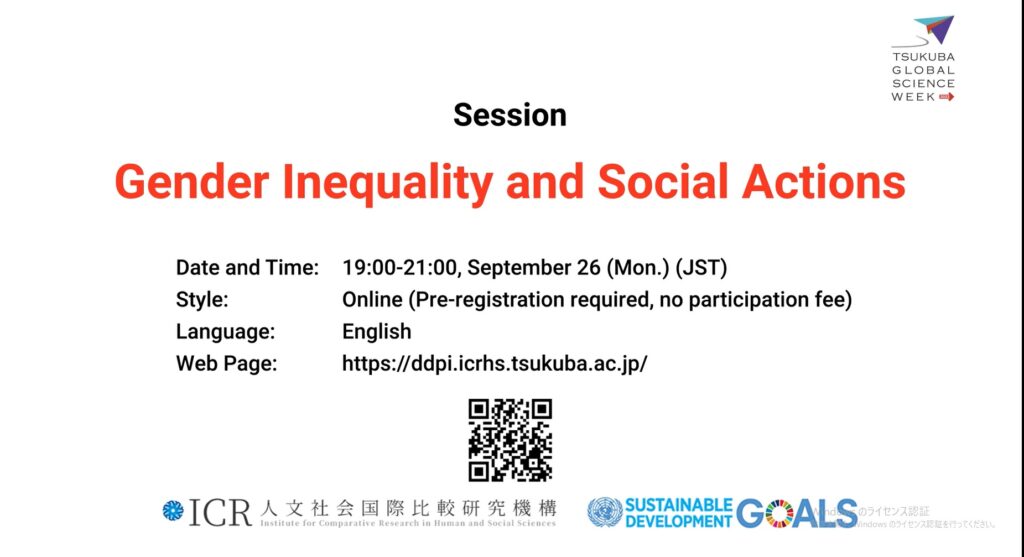
The DDPI project has organized a “Young Researchers’ Seminar” on August 10 (the first event), mainly for post-doctoral and graduate students in the humanities and social sciences, to arouse young researchers’ interest in a wide range of topics related to solving issues of disparity and inequality, the potential of digital technology for this purpose (digital democracy), and digital transformation, and to expand their research horizons through research exchange and discussion.
The first session will be presented by Mr. Tamon Ota (Adjunct Research Fellow in Humanities and Social Sciences) and Ms. Kaoruko Ootsuki (Doctoral Student, International Japanese Studies Degree Program). The topics are as follows
Tamon Ota: “Solidarity Economy as Discourse: The Case of Organic Agricultural Trade in Ecuador” (tentative)
Kaoruko Otsuki: “Issues in Accepting Foreign Nursing Care Workers: Focusing on Foreign Technical Intern Trainees” (tentative)
※Please note that this seminar will be held internally.
| Date & Time | Wednesday, August 10, 2022, 13:30-15:30 |
|---|---|
| Location | Online |
| Reporter |
Tamon Ota(Part-time researcher, Faculty of Humanities and Social Sciences) Kaoruko Otsuki (Doctoral student,Master’s and Doctoral Program in International and Advanced Japanese Studies) |
| Title |
Tamon Ota: “Solidarity Economy as Discourse: A Case Study of Organic Agricultural Trade in Ecuador” (tentative) Kaoruko Otsuki: “Challenges in Accepting Foreign Nursing Care Workers: Focusing on Foreign Technical Intern Trainees” (tentative) |
| Participation Fee | Free |
| Contact us |
DDPI@japan.tsukuba.ac.jp
|
